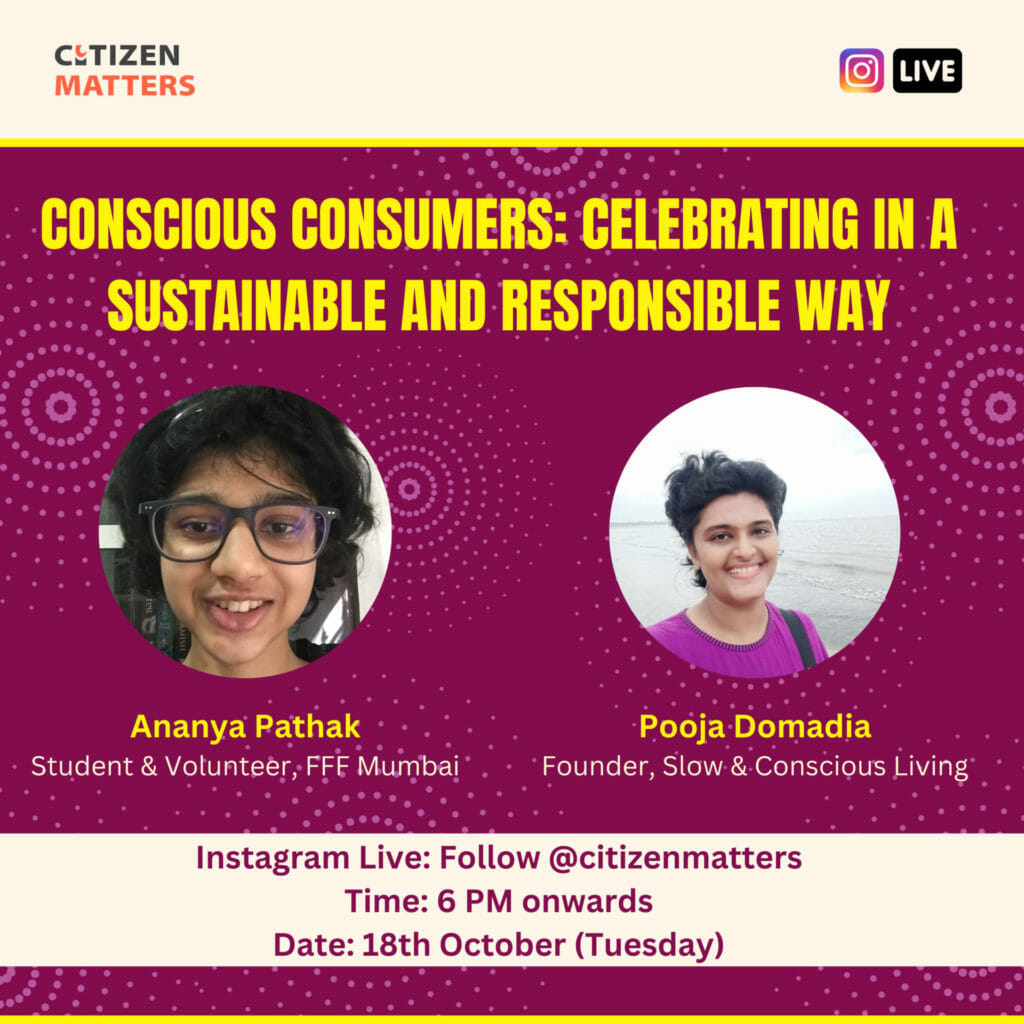As we gear up to celebrate Diwali, stalls selling firecrackers crop up across the country, homes are cleaned and new clothes are bought. We see round-the-clock advertisements for clothes, jewellery, gadgets, sweets and other food products with attractive offers. Little thought is spared for waste generated in the production, packaging and disposal of all the products we buy during festivals. Burnt firecrackers, huge garbage bags filled with disposable cutlery, packaging from gift boxes are a common sight after festival days.
Ever increasing waste and pollution levels
We grow up reading about the disastrous impact of firecrackers on the environment and our textbooks describe in vivid detail the horrors child labourers at firecracker factories undergo. Yet purchase of firecrackers is common to events like weddings apart from festivals. Even after dealing with the COVID-19 pandemic, people, and the system at large cares little for the impact air, water and noise pollution has on our health.
India produces 65 million tonnes of waste per day. On festival days especially the last three months of the year, waste generated increases exponentially. We are tempted to buy more and more things as we are influenced by trends, discounts and end of season sales. We often end up with unnecessary purchases. This endless loop of consumption and waste generation adds to the already poor waste management system.
Also read: Explainer: Segregating waste manually to minimise the burden on landfills
Growing consciousness about eco-friendly celebrations
At the same time, we have observed a rising trend among residents becoming conscious of the waste generated during festivities and they are switching to eco-friendly, minimalistic ways of celebrating events. Increasing awareness about the circular economy of waste is gaining prominence among the public, who are demanding that governments and companies do better. A large part of this process has been spearheaded by the youth, which has recognised the importance of climate justice. Young environmentalists are vocal about the implications of the waste crisis and consumerist culture. They are also actively campaigning for sustainable development and a lifestyle that is socially and environmentally conscious.
Join us as at Citizen Matters as we meet two such young environmentalists from Fridays For Future, Mumbai to ask them what the youth of the city, the financial capital of India, feel about this increasing consumerism.
- Do the youngsters, many of whom are passionate about climate justice, want the people to come together to change the way we celebrate?
- Are the young climate warriors able to convince their friends and parents to care about eco-friendly ways to celebrate?
- How can festivities and celebrations be minimalist?
- Do they want new laws to ensure systemic changes?
The Instagram Live session will be conducted on 18th October, 2022 from 6-7pm. We shall be joined by Pooja Domadia, former journalist and eco-entrepreneur, and Ananya Pathak, a high school student and volunteer for Fridays for Future.
Conscious consumers: Celebrating in a sustainable and responsible way

Also read: A guide to partying the low-waste way
Our Speakers
Pooja Domadia
A former journalist, Pooja Domadia founded Slow & Conscious Living, a business that works to spread awareness and facilitate environmentally and socially conscious lifestyles with Earth-friendly products.
Slow & Conscious Living works as a platform for products from several NGOs and eco-entrepreneurs. A lot of these are handmade by tribal and rural folks in remote India.
This conscious living journey began over five years back when Pooja started choosing her everyday products & services mindfully and living a low waste lifestyle. She hopes to reach a zero waste mark someday with easy and effective DIY alternatives to synthetic chemicals and plastic in our daily lives.
She is also a co-founder of हम Prithvi से, a venture that conducts low-waste and Earth-conscious lifestyle workshops.
Find her on Instagram and follow @fffmumbai1
Ananya Pathak
Ananya Pathak is an arts and social sciences (high school) student. She is deeply passionate about intersectional climate justice and a joy for writing. She volunteers at Fridays for Future, Mumbai, a movement initiated by a 15-year-old Swedish environmentalist, Greta Thunberg. She also founded her school’s Climate Action Club. The students have brought environmentalism to the front of student-led social justice and community-centric initiatives.
Through her advocacy for sustainable living and inclusive climate policies, she has worked in the intersections of the media and eco-feminist spaces. You will typically find her adding perspective to climate discourse, going down a research rabbit hole. She also enjoys cooking a plant-based one-pot meal.
Follow Climate Action Club on Instagram!
Follow @citizenmatters on Instagram.
Look out for the poster and ‘Set Reminder’ for the event to receive notifications about the Instagram Live.
When we are Live, you can join the session, ask questions in the comments section or Direct Message us your questions in advance!